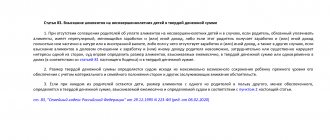Is it possible to apply for alimony through State Services?
You can apply for alimony through State Services, but not quite like that. A confirmed account on the portal can be used to log into the State Automated System “Justice”, through which documents are sent to the court.
You cannot apply for alimony on the portal itself.
What is important to remember:
- If you have a standard account, you will not be able to log in through GAS Justice.
- Only documents are submitted online; meetings will be held in any case. But you can file a petition for consideration of the case in absentia.
- The plaintiff himself or his representative has the right to send an application.
- Through GAS "Justice" you can submit a statement of claim or an application for the issuance of a court order. It all depends on the order in which alimony is collected - through a claim or writ proceeding.
Legal advice: if possible, it is better to collect alimony through writ proceedings. Unlike a claim, where the case is considered for a month, the order is issued within five days from the date of receipt of the application (Article 126 of the Code of Civil Procedure of the Russian Federation). But if the debtor files objections within 10 days from the date of receipt of a copy of the order (Article 128 of the Code of Civil Procedure of the Russian Federation), payments will have to be recovered through a claim (Article 129 of the Code of Civil Procedure of the Russian Federation).
Collection through court
If you come to the Magistrates' Court to apply for alimony, then in a standard situation they will simply initiate the execution of a court order. If the situation is non-standard, then a statement of claim is filed directly.
What could cause:
- requirement to assign alimony in a fixed amount;
- if the defendant has other children to whom he also has a maintenance obligation;
- if paternity needs to be established;
- if a court order was previously issued, but it was canceled by the defendant.
The application is accepted at the place of residence of the defendant or plaintiff. After the application is received, a court hearing is scheduled. You can attend it or write a statement about consideration in your absence. If you are not satisfied with the court decision, you can appeal it. In complex situations, multiple meetings may be required.
When can you apply for alimony through State Services?
You can apply for alimony through the State Services during marriage, during the divorce process, or after it, if we are talking about payments for the maintenance of a child shared with the defendant.
Alimony is also collected through the court from other people:
- spouses and former spouses;
- adult children;
- parents;
- other relatives.
Let's look at the features in detail.
For a minor child
To collect payments for a child under 18 years of age, you do not have to get divorced. It is enough to indicate in the application that the defendant does not take part in its content.
| Child support is collected in three different forms | ||
| Share of salary (Article 81 of the RF IC) | In a fixed amount of money (Article 83 of the RF IC) | In mixed form (Article 83 of the RF IC) |
| The size of the TDS is determined taking into account the regional subsistence minimum per child. Usually 0.5-1 PM is charged | This is relevant if the debtor has an official job and additional income. For example, from renting out a car or real estate |
For an adult child
Adult children can demand alimony from their parents if they themselves are disabled or need help (Article 85 of the RF IC). Disability means disability of any group.
Per parent
If they wish, parents can also recover payments from adult able-bodied children (Article 87 of the RF IC). It is important that they are disabled and prove their need for financial support.
Parental support is paid in a fixed amount. Its size depends on the regional cost of living.
To your spouse or ex-wife
Married spouses can also demand alimony for themselves (Article 89 of the RF IC). For example, they have the right to be collected by a disabled spouse in need, a woman during pregnancy or maternity leave for up to three years; needy husbands and wives caring for a disabled child under 18 years of age or adult children with childhood disabilities of group I over 18.
Former spouses have the right to demand payment in several cases (Article 90 of the RF IC):
- During pregnancy and for three years after the birth of the child.
- Reaching retirement age no later than five years from the date of divorce, if the need for financial support can be proven.
- Caring for an adult child who has been disabled since childhood, group I, and minor children with disabilities.
- Obtaining disability no later than one year from the date of divorce, if need is proven.
For spouses and former spouses, alimony is established in a fixed amount. It also depends on the PM.
To other relatives
Other relatives are brothers, sisters, grandparents, grandchildren, granddaughters. They can also collect alimony for themselves; the court will set a fixed amount (Article 98 of the RF IC).
How to terminate an alimony agreement? Step by step order
How to voluntarily pay child support? Step by step order
Who cannot become an alimony payer?
Before you apply for child support, you should clarify the situation - not everyone can pay. Although parents are obliged to support the child until he comes of age, even if he is doing well financially, there are cases when a person is exempt from this obligation. True, even the incapacity of a parent, deprivation of parental rights, or incapacity will not save you from financial obligations. Contributions may be refused:
- A spouse who has become disabled due to alcohol, drug abuse, crime and other addictions (such as gambling);
- For the former spouse, subject to a short marriage (to determine the “shortness” of the marriage, age, duration of their previous relationship, etc. are taken into account);
- Parents who shied away from their obligations to support their children or lost their rights altogether;
- Teachers who cared for children for less than 5 years or did not do their job well enough;
- For a former spouse (disabled and in need) upon his remarriage;
- A baby who was adopted by a new family.
In other cases, there is a high probability that payment of assistance will not be possible.
How to apply for alimony through State Services: step-by-step instructions
Let's look at step by step how to collect child support through State Services:
- File a claim.
- Send one copy of the application to the defendant.
- Log in to GAS "Justice".
- Fill out the electronic form and submit an application.
- Attach other documents.
- Send everything for review.
Tip: You can send documents from a smartphone or PC. It’s better to choose the second option - it’s more convenient for most people.
Step 1: drawing up a statement of claim
The statement of claim is drawn up taking into account the provisions of Art. 131 Code of Civil Procedure of the Russian Federation. The easiest way to do this is through MS Word. The document will then have to be uploaded to the State Automated System “Justice”.
What you need to indicate in the statement of claim:
- name and address of the court;
- Full name, address, telephone number of the plaintiff;
- Full name, address of the defendant;
- whether the marriage took place. If yes, indicate the dates of conclusion and termination;
- Full name, date of birth, details of the birth certificate of the child for whom payments are being collected;
- circumstances of the case: non-participation of the defendant in the maintenance of his son or daughter; does he have official income?
- claims: to collect alimony in the amount (form and amount are determined by the plaintiff);
- inventory of submitted documents;
- date and signature.
Step 2: sending the statement of claim to the defendant
Until October 1, 2021, the courts sent copies of documents to the defendants, but from that date this becomes the responsibility of the plaintiffs. Copies of statements of claim and documents that they do not have are sent to the defendants' addresses.
Advice: it is better to send documents by registered mail with acknowledgment of receipt. When the notification is in hand, you can proceed to the next step.
Step 3: authorization on GAS “Justice”
Before applying for alimony through the State, you need to log in. To do this, just click on the “Login” menu in the upper right corner, or go straight to submitting an application.
During the authorization process, you must check the box next to your consent to the processing of personal data, then click on “Login.”
Step 4: Submit your application
To send an application, you need to click on “New Appeal”, then select “Civil Proceedings” and “Statement of Claim”.
At the top of the page that opens, enter the following data:
- Which court are the documents submitted to?
- Method of contact: in person or through a representative.
- The essence of the application (a pre-prepared claim is attached).
- Attachments to the application (documents that are needed to consider the case).
Note! The plaintiff may appeal to the district court at the defendant’s address or his place of residence. He chooses the court independently (Article 29 of the Code of Civil Procedure of the Russian Federation). Magistrates now only consider applications for the issuance of court orders if the collection of alimony is required.
Step 5: Upload Documents
Along with the statement of claim, you must upload scanned copies of the following to the electronic form:
- passports;
- child's birth certificate;
- certificates of marriage or divorce;
- notifications of service of documents to the defendant;
- certificates from place of residence;
- certificates of income of the plaintiff and defendant.
If there is no information about the defendant’s earnings, at the request of the plaintiff, the court may request documents at a preliminary hearing.
Step 6: sending the application and documents
When everything is ready, just click on “Generate application”. Before this there will be a block “Payment of state duty” - you do not need to pay it. According to Art. 333.36 of the Tax Code of the Russian Federation, plaintiffs in cases of alimony collection are exempt from payment.
What affects the amount of alimony
The amount of alimony is determined according to the following criteria:
- The method of collecting finances is a fixed amount or a percentage of income.
- The method by which the transfer is established is by agreement of the parties or by court decision.
- Depending on the social status of the payer - employed citizen, pensioner, unemployed, student.
- The parent’s marital status is the presence of children from other marriages or extramarital relationships.
- Status of a minor – age, state of health.
The factor influencing the amount of alimony for a spouse is his need and the level of income of the payer.
In what cases can payments be increased?
Despite the strictly established percentages that are calculated from the alimony payer, there are cases when transfers increase. These include:
- Decrease in the recipient's standard of living.
- Rising prices for goods and services.
- Deterioration of the minor’s health, which requires additional money for medicines and treatment.
An obvious reason is the death of the parent raising the child.
In what cases can the amount of alimony be reduced?
The amount of alimony may be reduced under the following circumstances:
- the presence of a source of permanent income for the child himself, for example, in connection with employment or entrepreneurial activity;
- deterioration of the payer's health, due to which his income decreases or expenses increase, he must be recognized as a disabled person of the first or second group;
- collection of child support from different mothers; for a child, as a rule, 25% is charged, and for two – 33%, which is divided between the children;
- the alimony provider has a very high income, 25% of which is too high an amount than required for child support;
- a sharp and significant decrease in the payer’s income, applies when alimony is paid in the form of a fixed amount;
- the parent has other dependents - minor children, disabled parents;
- the child is fully supported by the state - in an orphanage.
These grounds are also typical for alimony for spouses and parents.
When payments stop
The basic grounds for terminating alimony payments include:
- The child reaches adulthood.
- Death of one of the parties - the recipient or payer of alimony.
- Re-registration by a parent in favor of a child of assets that generate a stable income commensurate with the amount of monthly transfers.
Today it is impossible to give an unambiguous answer to the question of whether it is permissible to submit an application for the collection of alimony through the government services portal. This service is not yet available in all regions of the country, but the functionality of the service is constantly expanding, so soon the option will become available to all Russian citizens.
If you apply for alimony through State Services: what happens next?
First, documents undergo automatic verification.
A notification will be sent by email based on the results. After this, the judge will accept the materials for proceedings and issue a ruling on preparing the case for trial within five days from the date of registration of the application (Article 147 of the Code of Civil Procedure of the Russian Federation). The further process looks like this:
- The parties receive determinations with the date and time of the preliminary hearing.
- The preliminary meeting is held in the form of a conversation. The judge will clarify the claims and the possibility of resolving the dispute peacefully (Article 148 of the Code of Civil Procedure of the Russian Federation). If necessary, the parties may submit additional documents regarding the case.
- The judge issues a ruling on assigning the case to trial (Article 153 of the Code of Civil Procedure of the Russian Federation). The next meeting is usually held in 10-15 days.
- During the proceedings, the parties present their arguments and evidence.
- Based on the results, the judge alone makes a decision in the deliberation room, then announces it in the hall (Article 193 of the Code of Civil Procedure of the Russian Federation).
The writ of execution is issued to the claimant immediately after the decision is made in final form. Payments are awarded from the moment you go to court (Article 107 of the RF IC). Copies of the decision are transferred to the parties against receipt within five days from the date of adoption (Article 214 of the Code of Civil Procedure of the Russian Federation).
Important! The claimant has the right to transfer the writ of execution to bailiffs or to the organization at the debtor’s place of work. If he is employed, the accountant will calculate alimony regularly within three days after the salary is transferred (Article 109 of the RF IC).
Simplified recovery through a court order
To facilitate the work of the court, it has become possible to simplify the procedure for applying for alimony using a court order. The courts were inundated with similar cases in which identical decisions were made, so the trial itself can now be avoided.
If the applicant has a reasonable right to demand alimony, if he has provided a full package of necessary documents and requires standard deductions from his salary of a quarter, a third or half, he can obtain the right to alimony with the help of a court order.
That is, there will be no trial itself. The plaintiff turns to the clerk of the magistrate's court and asks to issue a court order to receive alimony from the defendant. The application and the documents attached to it are accepted, and within the prescribed period the judge issues a court order, which in its force is equal to a writ of execution. That’s it, it can be sent to the defendant, taken to the accounting department at his place of work, or transferred to the bailiffs.
The recipient of a court order can appeal it if he does not agree with the procedure and amount of alimony awarded. Then a standard court hearing will be initiated.
What else is available for collectors and debtors on State Services
By logging into the State Automated System “Justice” through State Services, you can use other functions of the service:
- Receive information on court cases in which you are a participant. It is enough to go to the “Cases” section, indicate the date of receipt of the application, case number, UID, full name. judges.
- View request history.
Legal advice: if you need notifications to be sent not only to email, but also to your phone via SMS, you should go to your profile on the State Automated System “Justice” and check the box. It is not set automatically.
Package of documents
As we found out, it is impossible to apply for alimony through State Services. This can only be done by personally applying to the Magistrates' Court or through your representative. Regardless of whether it is just a court order or a real meeting, the plaintiff brings:
- birth certificate of the child(ren);
- marriage or divorce certificates, if the marriage was registered;
- certificate of paternity, if issued;
- certificate of residence.
Arbitrage practice
The method of application does not matter. Even if it is sent through State Services, the case will be considered in the general manner, taking into account the provisions of the Code of Civil Procedure of the Russian Federation.
Here are some examples from judicial practice:
- The woman recovered from her ex-husband payments for the maintenance of their common minor child - 1.5 monthly monthly (Decision No. 2-3678/2020 2-3678/2020~M-1904/2020 M-1904/2020 dated July 27, 2021 in case No. 2-3678/2020).
- The plaintiff and defendant were in a registered marriage, but actually lived separately. The child remained with his mother; she was on leave to care for him for up to three years and wanted to collect child support for herself - 1 monthly wage in the region. By decision No. 2-2299/2020 2-2299/2020~M-1878/2020 M-1878/2020 dated July 22, 2021, in case No. 2-2299/2020, the court approved only 0.5 PM.
- A disabled mother collected alimony from her adult son for herself - 5,000 rubles. The defendant himself admitted the demands (Decision No. 2-1661/2019 2-198/2020 2-198/2020(2-1661/2019;)~M-1659/2019 M-1659/2019 dated January 13, 2020 in case No. 2-1661/2019).
What is the amount of alimony payments?
In the Russian Federation, the minimum amount of alimony is not established at the legislative level. The amount in each case is individual, as it depends on the level of income and social status of the payer. Moreover, the needs of the child are taken into account, but the rights of the parent are not infringed.
Payments are set either as a fixed amount or as a percentage of wages.
If in the first case the size of the transfer depends on life circumstances or agreements between spouses, then in the second case a specific percentage is established depending on the number of children:
- 25% - for one child;
- 33% - for two children;
- 50% - for three or more.
Moreover, it does not matter how many marriages the payer has or whether there are children. The specified percentage in monetary terms is divided among all minor children of the parent.
When calculating alimony for a spouse, the cost of living indicator is used, which is not related to the income of the payer. For example, the payment amount is one or half of the monthly minimum established in the recipient’s region of residence.
Often people agree on the amount of payment for their parents themselves, but the amounts are also established through the courts. The calculation takes into account the income of all interested parties, both the recipient and the payer.
Moscow
In the capital, there are no regional regulations that additionally regulate the assignment of alimony; the basic one is Article 81 of the Family Code.
In accordance with this law, the amount of deduction for one minor child is not set below a quarter of the parent’s income.
An alternative method of supporting a child is to re-register property in favor of the child. Also, in some cases, a one-time transfer of a large amount of money is acceptable.
St. Petersburg
In St. Petersburg, as in other regions of Russia, the payment of alimony is regulated by federal legislation, or more precisely, by the Family Code. An important feature is that a fixed amount of payments is provided solely by agreement of the parties, but in court - only a percentage.
Lawyer's answers to private questions
Is it possible to order a certificate of alimony through State Services?
Yes. To do this, you need to log in to the portal and fill out an application for a certificate through this section. An alternative option is to request information through your personal account on the FSSP website. There you can also log in through your profile on State Services.
Is it possible to apply for alimony through State Services in Moscow?
In the capital, most services are provided on the mayor's website. You cannot apply to the court there, but you can get on the waiting list to receive a trip to a sanatorium for your child, apply for state and municipal benefits for children, subsidized meals, and much more.
How to check the accrual of alimony debt through State Services?
To do this, you need to log in to your FSSP personal account through State Services here, go to the “Internet reception” section and fill out an application for issuing a resolution to calculate alimony debt.
How to find out the alimony debt through State Services?
The debt will be displayed in your personal account on the portal. You can also view it in the “Data Bank of Enforcement Proceedings” by entering your full name. debtor. But the actual amounts of debts are not always displayed there.
Is it possible to apply for a reduction in alimony through State Services?
Yes, but this is also done through the State Automated System “Justice”, where you can log in through an account on the portal. The amount of payments may be reduced if there are real reasons: for example, the debtor has become disabled, has a serious illness, etc.
We check the debt - for defendants
If you are a defendant in a case regarding the assignment of alimony, the State Services portal will help you quickly find out about court debt. In the service catalog, go to the “Authorities” tab and find the Federal Bailiff Service.
The agency electronically provides information about the existence of enforcement proceedings and judicial debt.
What other questions arise?
In practice, people have many questions about alimony collection even before submitting an application. There are no fewer of them during the trial. To avoid mistakes and incidents, it is recommended to enlist the support of a qualified lawyer in advance.
Who is eligible to apply
Depending on the category of alimony obligations, the following have the right to go to court:
- The parent who actually supports him and with whom he lives.
- A wife who is pregnant with their common child.
- A wife raising a joint child who is not yet 3 years old.
- A spouse who provides constant care for a common disabled minor child or a disabled child of group 1 since childhood.
Attention! Guardianship and trusteeship authorities also have the right to file a claim for collection of child support against their parents (one of them). In the absence of an agreement between the parents on the payment of alimony, failure to provide voluntary maintenance to the children, and failure of one of them to file a claim in court.
Also, if one or both parents are deprived of parental rights, the children’s guardians and trustees have the right to initiate the procedure for collecting funds from them for the maintenance of their wards. Deprivation of parental rights is not a basis for exemption from the obligation to support your child - Art. 71 IC RF.
Deadlines for filing and for what period can be recovered
A woman who has the right to alimony has the opportunity to apply to the court with a corresponding application, regardless of the period during which such a right arose for her, if the maintenance was not previously provided under an alimony agreement - Art. 107 RF IC.
Alimony is awarded from the moment you go to court. It is also possible to recover them for the past period if two conditions are met simultaneously:
- Only for the 3 years preceding the date of application.
- The court found that up to this point the plaintiff had taken measures to receive money from the defendant, but he did not receive the funds due to the fault of the latter.
Such measures are evidenced by clause 11 of the RF PP No. 56:
- The plaintiff’s appeal to the defendant (by sending registered letters with notification, telegrams, electronic mail) with a demand for payment of alimony or with a proposal to conclude an alimony agreement.
- Applying to the court with an application for a court order (if such a judicial act was later cancelled).
Can they refuse alimony during marriage?
The court has the right to refuse to grant maintenance to a woman if:
- She has no income for subjective reasons.
- The defendant already has wage deductions in respect of other family members (children, parents, brothers, etc.).
- The plaintiff leads an immoral lifestyle, abuses alcohol, and has a drug or other addiction.
- A woman is in a de facto family relationship with another man.
- The applicant committed a crime against the defendant.
- Short duration of marriage.
When collecting funds for a child, the court will not satisfy the claims if - Art. 120 IC RF:
- The child is over 18 years old and does not have a disability.
- The minor was emancipated. This is possible upon employment, registration of individual entrepreneurs or marriage - Art. 27 Civil Code of the Russian Federation.
- Death of a child or payer.
- The defendant is not the biological father of the child or paternity has not been established.
- An alimony agreement has been concluded, under which monthly payments are replaced by a lump sum payment or a gift of expensive property to the child: real estate, vehicles, jewelry, securities, etc. - Art. 104 RF IC. Alimony obligations are considered fully repaid.
What to do after receiving a decision to collect alimony
Dates for entry into force of judicial and notarized acts:
- Alimony agreement - immediately.
- Court order - 10 days.
- Court decision - 30 days.
The alimony agreement acquires legal force from the moment of its conclusion. It, like a court order, is equivalent to writs of execution. But after the court decision comes into force, you still need to obtain a separate writ of execution. It is issued upon application by the same court that made the previous decision.
The court order comes into force after 10 days from the date of receipt by the payer - Art. 128 Code of Civil Procedure of the Russian Federation. If during this period he sends objections to the execution of the judicial act, then the judge who issued the order immediately cancels it.
After receiving the judicial act, you must wait for it to enter into legal force. The court decision acquires full legal force one month after it is made in final written form - Art. 321 Code of Civil Procedure of the Russian Federation. This condition applies if no appeal is filed within this period.
If the defendant managed to file it, then the court decision will come into force after the court considers this complaint, unless it is canceled during the appeal proceedings - Art. 209 Code of Civil Procedure of the Russian Federation. If the appellate authority overturned or changed the decision of the district (city) court and a new judicial act was adopted, it comes into force immediately after its issuance.
The writ of execution and acts equivalent to it may be immediately transferred to the FSSP of the Russian Federation at the payer’s place of residence or place of work. In both cases, you must provide the details of the bank account where you want to transfer the money, if they are not indicated in the executive document itself.
What to do if child support is not paid
If, despite the measures taken within the framework of enforcement proceedings or independent collection under enforcement documents, the spouse still does not pay the due funds, then he accumulates a debt.
After some time (but not more than 3 years - in order to avoid the expiration of the statute of limitations), the recipient has the right to contact the FSSP to record and calculate the debt. The amount of debt is determined by the bailiff and is legally secured by issuing an appropriate resolution - clause 2 of Art. 102 FZ-229.
After receiving such a document, it becomes possible to go to court again to collect alimony debt and the corresponding penalty - Art. 113 RF IC.
If you disagree with the amount of alimony debt determined by the bailiff, interested parties from among the participants in the procedure have the right to appeal the actions of the official:
- To the management of the relevant department.
- To a higher authority.
- To the prosecutor's office.
- To court.
At the same time, a party to enforcement proceedings whose interests are violated also has the opportunity to file a claim in court to determine the amount of debt - clause 4 of Art. 102 FZ-229.
If the provisions of the writ of execution are not clear, the method and procedure for its execution, the claimant also has the right to file an application with the court or a notary for clarification of these legal issues - clause 1 of Art. 32 FZ-229.
Attention! If the payer-debtor did not work or no one provided documents confirming his earnings/income, the alimony debt is determined based on the average wage in the Russian Federation on the day of collection.
Current information about such indicators is posted in information and legal systems and on the official Internet resource of Rosstat.
Advantages of using the Gosuslugi portal
Completing an application through the Internet portal will not take much time and will not be difficult if you have the knowledge of how to do it correctly. The service is relevant for mothers who have young children who require constant supervision. When visiting government agencies, you will have to look for someone who will agree to look after them, and submitting an application online will allow you to fill out the form at a convenient time.
State Services Portal
It should be understood that the Gosuslugi portal only makes it possible to fill out an application for the payment of funds for the maintenance of young children, and the need to attend court hearings in person remains. The only option to avoid being in the courtroom is to write a petition to consider the case without the plaintiff. Registration via the Internet is especially important during the period of quarantine during the coronavirus pandemic.
Procedure for paying alimony
Alimony can be paid and received voluntarily or through the court. Let's look at the example of parents.
Voluntarily is when parents enter into an agreement to pay child support. They agree in writing on the amount, payment procedure and other conditions and have the agreement certified by a notary. For example, parents may agree in an agreement that the father pays RUB 30,000 per month for child support. If something goes wrong, the mother can recover this money through the court.
If the father decides to pay child support voluntarily, it is better to write an agreement and be sure to have it notarized. If this is not done, the court may consider that the money paid was not alimony, and the father will be recognized as a debtor.
Through the court . If one of the parents does not want to support the child or the former spouses cannot agree on the amount of alimony, they can be collected through the court.
Crib
- It is possible to apply for alimony during marriage without resorting to divorce.
- A child under 18 years of age, as well as a spouse, in cases established by law, have the right to alimony payments.
- Payment of alimony can be voluntary (according to a written, notarized agreement) and forced (according to a judicial act).
- First, you need to determine whether there are legal grounds for collecting alimony in your case.
- Draw up an appropriate statement (a claim or a court order)…
- Generate the necessary documentation package.
- Prepare the number of copies of the application and attachments according to the number of participants in the process.
- Send the defendant a prepared copy of the application with attachments. Be sure to keep receipts and other documents confirming such shipment.
- Submit an application and documents to the court in any available way.
- If you were unable to obtain any documents on your own, notify the judge about this before the start of the process.
- The court order is issued within 5 days from the date of filing the application and comes into force after 10 days. But the potential payer has the right to cancel it within these 10 days. A reasoned court decision on the claim is also made within 5 days after the announcement of the operative part.
- The execution of a judicial act and alimony agreement may be entrusted to the FSSP.
- For evasion of alimony payment, the payer bears legal liability - civil, administrative, criminal.
Have any of your friends collected alimony while married? If so, who exactly and how did he do it?











